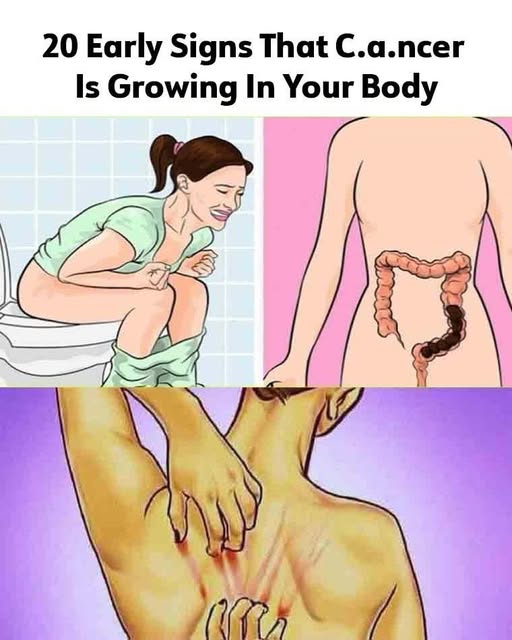Before the invention of advanced scans and lab tests, our greatest defense against disease was something we still have today—our body’s own warning system, and when something serious like cancer starts to develop, the body doesn’t stay silent; it begins with a whisper, then a nudge, and if ignored, eventually it screams, which is why recognizing the early signs is crucial to catching cancer before it advances.

Cancer almost never appears overnight; most of the time, it introduces itself with small, subtle changes that are easy to dismiss, but paying attention to those early warning signs could make all the difference in diagnosing the disease early, beginning treatment sooner, and greatly improving survival chances, so here are 20 early signs your body may be giving you that should never be ignored, and if any seem familiar, it’s time to schedule a conversation with your doctor.
Among the more subtle symptoms you might overlook are wheezing or shortness of breath, often mistaken for allergies but sometimes the first clue to lung cancer; frequent fevers or infections, which could point to leukemia affecting your immune system; difficulty swallowing, which might suggest throat, esophageal, or even lung cancer; constant weakness and fatigue that persists even after rest, possibly signaling the body’s energy being drained by cancer; feeling full quickly after just a few bites or a sudden loss of appetite, a potential early sign of ovarian cancer; and sudden food aversions, particularly to coffee, alcohol, or cigarettes, which can be early symptoms of pancreatic cancer. As for visible changes that shouldn’t be brushed off, rectal bleeding or blood in your stool is a clear red flag for colorectal cancer; persistent lumps in the neck, underarm, or groin could indicate swollen lymph nodes tied to lymphoma or leukemia; unexplained bruising or bleeding might signal a platelet disorder often linked to leukemia; persistent bloating or rapid abdominal weight gain could point toward ovarian cancer, often misdiagnosed as minor digestive trouble; and unexplained weight loss without trying often points to digestive system cancers like colon, stomach, or even liver cancer affecting metabolism.
Additional physical warning signs include a red or swollen breast, or a newly inverted nipple, which could indicate inflammatory breast cancer; swelling or puffiness of the face, often associated with small cell lung tumors that block chest blood vessels; sores that won’t heal, whether on the skin, lips, or elsewhere, possibly signaling early skin cancer; and unusual changes in fingernails, such as dark streaks, pale beds, or clubbing, potentially tied to cancers like lung, liver, or skin cancer.
Then there are types of pain that demand attention, such as heavy periods or bleeding between cycles, which may suggest endometrial or uterine cancer; a chronic cough or chest pain that doesn’t go away, which could be linked to lung cancer or leukemia; persistent pelvic or abdominal pain, a possible warning sign of ovarian cancer or an enlarged spleen from leukemia; pain in the lower back or right side, which may point to liver cancer or breast cancer metastasis; and ongoing stomach discomfort, cramping, or indigestion that could indicate colorectal cancer and should be investigated if it doesn’t resolve. To lower your risk of cancer starting today, you can boost your vitamin D levels through safe sun exposure and quality supplements, as low vitamin D levels are linked to a higher cancer risk; balance your insulin by cutting out processed foods and sugar to avoid insulin spikes associated with prostate cancer development; commit to daily exercise, even a 30-minute walk, to strengthen your immune system and regulate insulin; add more lycopene-rich foods like tomatoes, watermelon, and berries to your diet for antioxidant protection; limit exposure to toxins by reducing contact with pesticides, air fresheners, and harsh cleaners, helping your liver focus on essential detoxification; and be mindful of technology use by reducing screen time, especially at night, since while the link between cell phones and brain tumors is still debated, cutting back benefits overall wellness. Ultimately, your body is intelligent and constantly communicating with you, but in today’s busy world, it’s easy to tune out its signals, and while these 20 symptoms might not always mean cancer, they always mean that something deserves attention, so if you sense something wrong, trust your instincts, listen to your body, and talk to a medical professional because early detection truly saves lives and being proactive about your health could be the most important decision you ever make.





